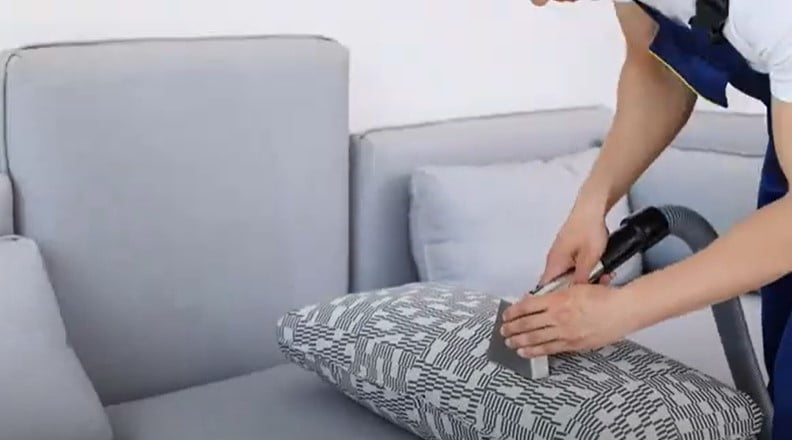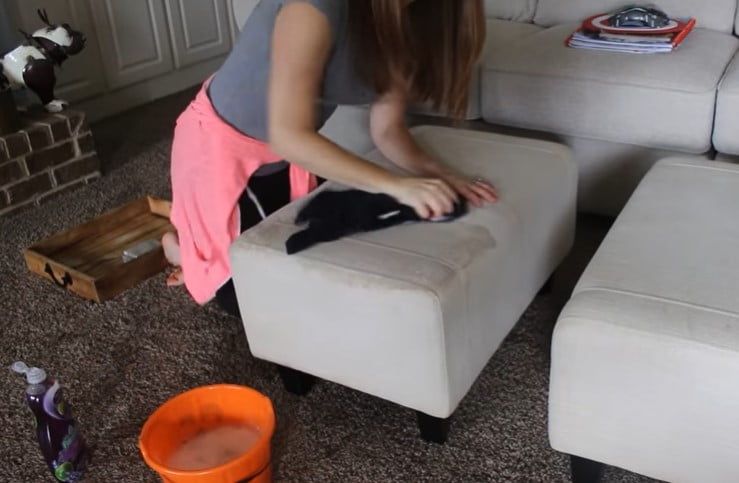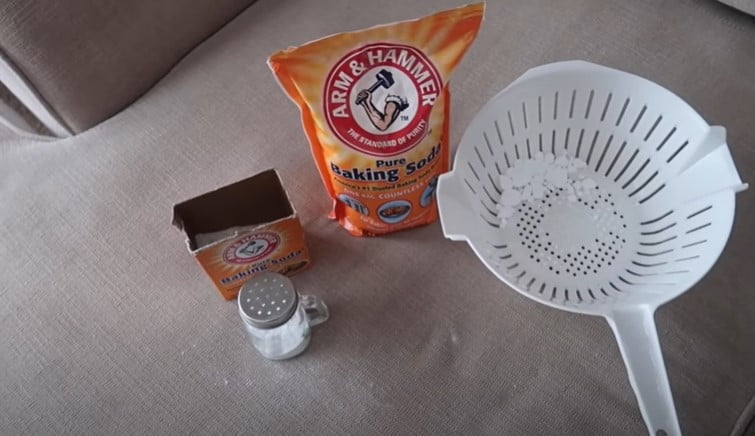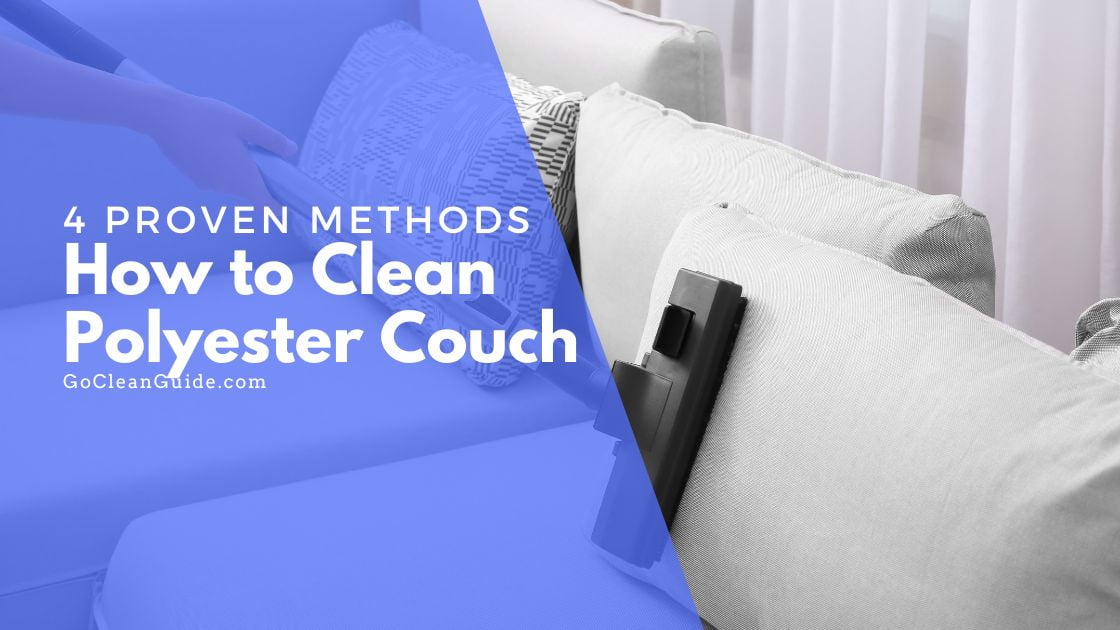Not sure How to Clean Polyester Couch? Polyester couches are a popular choice among homeowners due to their durability, affordability, and versatility. However, like any other piece of furniture, they can gather dust, stains, and spills that can cause them to lose their charm over time.
Fear not! This article presents effective methods on how to clean your polyester couch and restore its fresh, inviting look. Armed with these practical tips, you’ll be able to tackle different types of stains, ensure regular maintenance, and prolong the lifespan of your couch. Let’s get started on reviving your polyester couch to its former glory!
How to Clean Polyester Couch Quick Guide
When it comes to how to clean polyester couches, there are a few different ways you can try. In this section, we share with you four effective methods. For more details continue reading.
- Water and Vinegar Method
- Commercial Cleaner Method
- Dish Liquid and Warm Water Method
- Baking Soda Method
How to Clean Polyester Couch: Methods
Whether you travel the commercial cleaner method or the natural ingredients route, these four methods on how to clean polyester couch will leave your furniture looking fresh!
Water and Vinegar
If the manufacturing label confirms that your polyester furniture can be safely cleaned with a water-based solution, experts usually recommend using a homemade mixture of vinegar, laundry detergent, and warm water.
- To create the solution, mix 1 tablespoon of vinegar and 1 tablespoon of laundry detergent with warm water in a clean spray bottle. Before applying it to the furniture, it’s important to test the solution in an inconspicuous area to ensure it won’t cause any damage to the color or texture.
- Once you’re confident that it’s safe to use, spray the solution onto the furniture and gently rub it in to clean. For stubborn stains, you may need to apply more pressure.
- After cleaning, there’s no need to rinse off the furniture. Instead, use a dry brush to revive the polyester’s original texture. Make sure to let the surface dry completely before using it again.
Using a Polyester Cleaner

To safely clean your polyester furniture, using a specialized polyester cleaner is highly recommended. One such effective product is the Black Diamond carpet and upholstery cleaner.
This exceptional cleaner is perfect for tackling spots, stains, and spills on various upholstery and fabric types. Not only does it possess strong cleaning power, but it is also safe for households with children and pets.
When using this product, begin by vacuuming the couch to remove any loose dirt and debris. Next, spray the cleaner directly onto the slightly dampened surface. Using a clean cloth, gently rub or blot the cleaner into the furniture.
To restore the texture of your furniture piece after cleaning, brush the fabric in a circular motion using a dry bristle brush. Finally, ensure that your furniture is thoroughly dry before resuming normal use.
Dish Liquid and Warm Water

Polyester is highly resistant to damage, but stubborn greasy stains from food or makeup can be quite troublesome. If you don’t have an upholstery cleaning product on hand, there’s a simple and effective DIY solution – dish soap. Here’s what you need to do:
- Take a bowl and mix a few drops of dish liquid or a mild detergent with warm water.
- Dip a clean cloth into the sudsy water and gently blot the stain repeatedly.
- Once you’ve treated the stain, use a damp clean cloth to rinse out as much soap as possible from the material.
- To expedite the drying process, first, soak up any excess moisture with a paper towel. If the spot is particularly saturated, you can use a hair dryer on a low setting.
By following these steps, you’ll be able to effectively remove those pesky greasy stains and keep your couch looking fresh and clean.
Baking Soda

Baking soda is a versatile and indispensable deep-cleaning agent that serves as both a deodorizer and a moisture absorber. When it comes to polyester couches, this household essential truly shines. Whether you’re dealing with wet stains, like pet urine, or dry stains, such as oils and soils, baking soda has got you covered.
- For wet stains, simply sprinkle baking soda onto the affected area and let it sit for at least 30 minutes. As it absorbs the moisture, it works its magic by neutralizing acidic odor molecules. Afterward, a thorough vacuuming is in order. To spot-clean the area, create your own vinegar spray and gently blot it up with a damp cloth.
- When it comes to dry stains, a paste made from baking soda and water is the secret weapon. Apply this paste to the stain and gently work it in using a dampened sponge. Watch as it effortlessly lifts the stubborn mark away. Finally, rinse away the paste with a clean, damp cloth, revealing a refreshed and clean surface.
Common Questions About How to Clean Polyester Couch
It’s time to answer some of the most common questions about How to Clean Polyester Couch.
What is the appropriate cleaning code for a polyester couch?
Cleaning codes for 100% polyester couches typically indicate a “W” for water-based cleaning. However, it’s possible to come across blends with natural materials that require a “S” code for dry-cleaning solvents, or even an “X” code that necessitates professional cleaning. If convenience is a key consideration, always verify the cleaning code before selecting your sofa to ensure it bears a “W” or “W/S” code.
How Often Should You Clean Your Polyester Couch?
Regular cleaning is key to maintaining the longevity and appearance of your furniture. The living room couch, in particular, is prone to spills, greasy meal stains, and pet hair. It serves as a trampoline for your kids and a cozy spot for your cat to doze off.
If you have polyester furniture, how often should you clean it? It is recommended to have a professional upholstery cleaning once or twice a year to keep it looking fresh. Sofas accumulate dust and dirt, which can pose health risks, especially for those with respiratory issues. If you opt for DIY cleaning, we suggest vacuuming weekly and giving it a more thorough cleaning every other week.
How to eliminate urine from a polyester couch?
Dealing with urine stains on your polyester furniture can be an unpleasant reality, especially if you have pets or children. However, there are effective ways to remove these stains without letting them ruin your furniture.
- A simple method to successfully eliminate urine stains from polyester furniture is to start by using a paper towel to blot as much urine as possible, then apply a mixture of baking soda and white vinegar to the affected area.
- Allow the mixture to sit for a while before gently blotting it away with a clean rag or fresh paper towel.
- If the urine has been sitting on the furniture for an extended period, you can try applying a mixture of hydrogen peroxide and a mild cleaner or dish soap.
- Apply the solution to the stain and thoroughly clean until the stain is removed. If any lingering odor remains after cleaning, using baking soda is an effective way to freshen up your polyester furniture.
How to remove chewing gum from a polyester couch?
When it comes to cleaning chewing gum, a different approach is needed compared to typical stains. If your children happen to leave gum on the living room couch, you’ll need to solidify it first to ensure easy removal. Attempting to pick it up while it’s still soft often leads to spreading or pushing it further into the polyester fibers.
The most effective method for removing chewing gum is to freeze it by gently rubbing it with an ice cube. Once it has hardened, the gum will easily detach from the material.
Video Cleaning a polyester sofa, it seemed clean, but the water after cleaning is very dirty.
Watch the following video to see how to clean polyester couch and get rid of the dirt and grime that may be hiding underneath.
Final Thoughts
Caring for your polyester couch need not be a daunting task. With the right approach and the use of commonly available household products, such as dish soap and baking soda, you can keep your couch clean and fresh. Regular cleaning and maintenance can greatly extend the lifespan of your couch, keeping it looking like new for years to come.
So, whether you’re dealing with everyday dust and dirt, stubborn stains, or even unexpected incidents like chewing gum or urine, these simple solutions can help you tackle it all effectively. Remember, the key to a well-maintained polyester couch is regular cleaning and immediate action when spills or stains occur. Happy cleaning!






